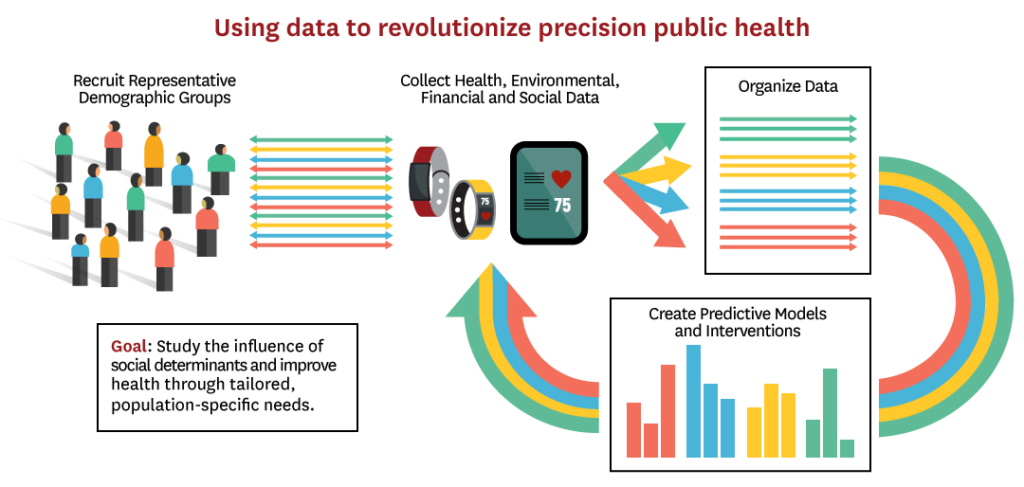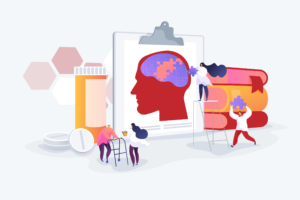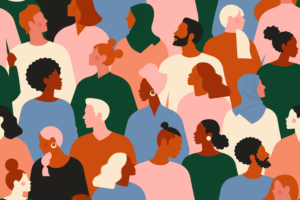The American Life in Realtime project includes data from vulnerable and historically underrepresented populations to help improve healthcare for all.
Although big data is revolutionizing healthcare, its potential has been limited by underrepresentation of vulnerable populations, including marginalized racial and socioeconomic groups that are at higher risk for poor health outcomes. To close this knowledge gap and to better understand health disparities, biomedical engineer Ritika Chaturvedi has led the creation of American Life in Realtime (ALiR), a first-of-its kind comprehensive digital health dataset representative of all demographic populations in the United States.
“Leaving out large portions of the population in these studies inevitably leads to disparities, because different populations exhibit different behaviors and experience different social determinants of health,” says Chaturvedi, a research scientist at the USC Schaeffer Center for Health Policy & Economics. “By gathering this information, we hope to create precision public health interventions that meet individual needs, rather than relying on our current one-size-fits-all approach.”
The ALiR Cohort
To date, more than 1,000 people have been enrolled in ALiR, which is conducted by the Schaeffer Center in partnership with the Understanding America Study at the USC Dornsife Center for Economic and Social Research (CESR) and Evidation Health. It is supported through a $1.2 million, four-year grant from the National Institutes of Health.
Sign up for Schaeffer Center news
The project has built a nationally representative cohort. Over half of the cohort are individuals from historically marginalized communities, including 1 in 4 who are Latino/a, 13% Black, 9% Asian, and 4% American Indian, Native Alaskan, Hawaiian, or Pacific Islander. Sixty-seven percent of the cohort have not completed college, and 57% have at least one chronic health condition.

Providing Health Trackers Helps Overcome Biases in Digital Health Data
Each ALiR participant received a Fitbit to collect information about physical activity, sleep and heart rate. The research team also created an app that surveys participants and awards points based on their levels of engagement and response.
Most digital health studies use “bring-your-own-device” designs. Providing Fitbits overcomes the biases that arise from only accumulating health data from people who already own fitness-monitoring devices, which has led to systematically overlooking important segments of the population.
“We already provide participants in the Understanding America Study with a tablet device with Internet access if they do not already have access. Giving Fitbits to a large portion of the study’s vulnerable population was a mammoth effort involving months of email and phone communication and adds another layer to understanding the digital divide,” says Arie Kapteyn, executive director of CESR.
“By using a representative sample and including validated digital health tools, the project offers a critical opportunity to identify disparities in key health outcomes and metrics, particularly in populations that are vulnerable to negative health outcomes but are currently underrepresented in this type of research,” says Luca Foschini, co-founder and chief data scientist at Evidation Health.
Analyzing Sleep Trends Sheds Light on Social Inequities
Chaturvedi unveiled the ALiR project at the 2022 World Sleep Congress in Rome. More than 2,300 attended the conference, including medical researchers from nearly 60 countries. The setting was appropriate, as most sleep interventions are developed from population averages that fail to account for complex and interrelated factors such as economic inequalities, healthcare access, systemic racism and lifetime stress.
Yet, “these social and structural determinants account for 60-80% of modifiable risk factors that contribute to health disparities, including sleep,” says RAND Senior Behavioral and Social Scientist Wendy Troxel, who is a Co-Investigator on the project working with Chaturvedi.
Enabling Future Research
ALiR will ultimately be made publicly available to benefit health research everywhere. “This infrastructure can be used to study myriad public health questions,” according to Chaturvedi. In addition, ALiR could help improve remote patient monitoring, expand participation in medical registries, and enhance the techniques of predictive medicine.
“Creating the American Life in Realtime panel assures that underrepresented groups are fully represented as digital health studies go forward,” Chaturvedi adds.
This project is supported by the National Library of Medicine of the National Institutes of Health under Award Number R01LM013237. The content is solely the responsibility of the authors and does not necessarily represent the official views of the National Institutes of Health.




You must be logged in to post a comment.